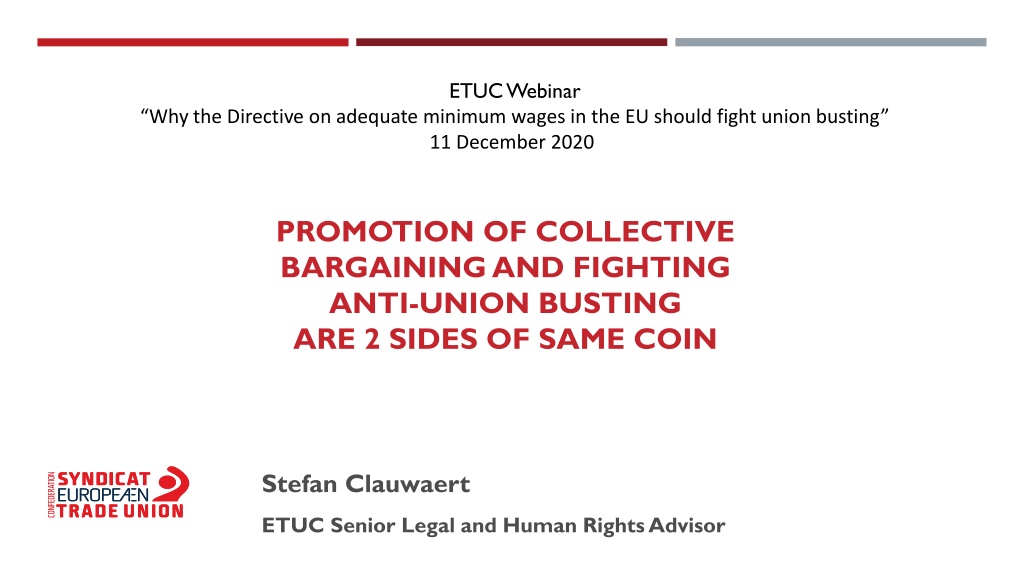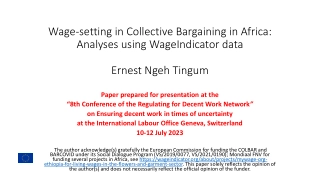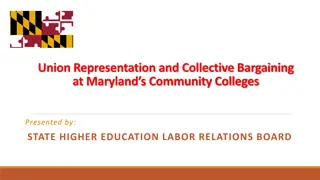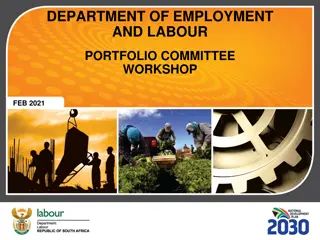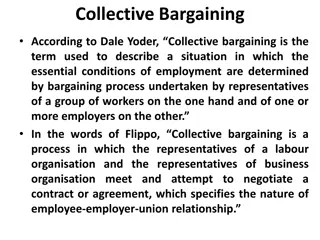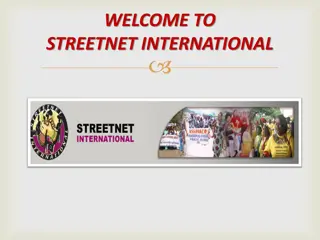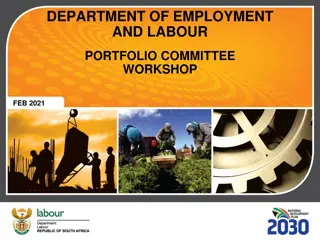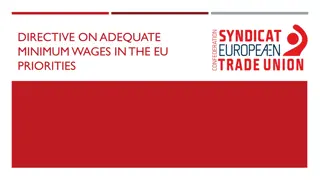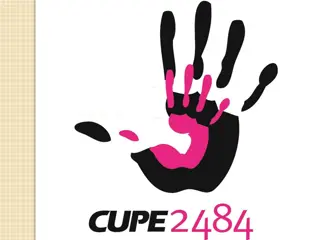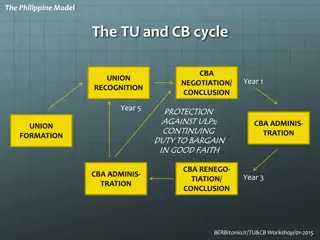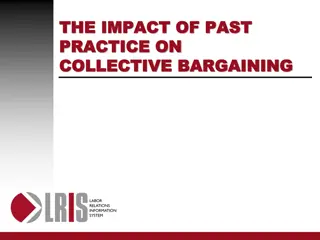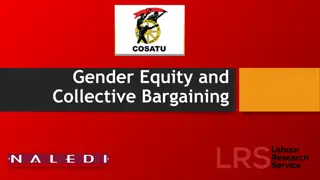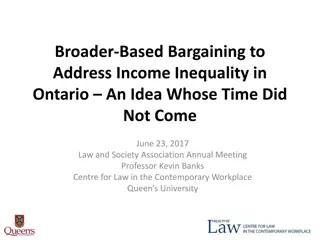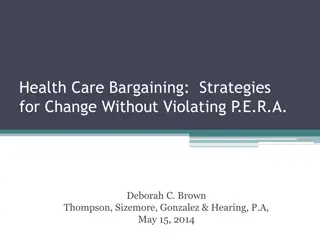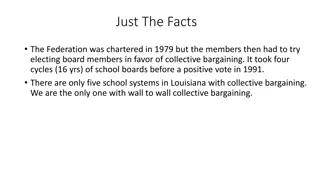Challenges in Promoting Collective Bargaining and Fighting Anti-Union Busting
The European Trade Union Confederation (ETUC) highlights the importance of the Directive on adequate minimum wages in the EU to combat union busting practices. While the Directive addresses some demands related to promoting collective bargaining, there is a need for further strengthening to effectively tackle anti-union actions by governments and employers. Anti-union busting activities are on the rise across Europe, posing obstacles to free and voluntary collective bargaining and trade union protection.
Uploaded on Sep 12, 2024 | 0 Views
Download Presentation

Please find below an Image/Link to download the presentation.
The content on the website is provided AS IS for your information and personal use only. It may not be sold, licensed, or shared on other websites without obtaining consent from the author. Download presentation by click this link. If you encounter any issues during the download, it is possible that the publisher has removed the file from their server.
E N D
Presentation Transcript
ETUC Webinar Why the Directive on adequate minimum wages in the EU should fight union busting 11 December 2020 PROMOTION OF COLLECTIVE BARGAINING AND FIGHTING ANTI-UNION BUSTING ARE 2 SIDES OF SAME COIN
ETUC OBJECTIVES Next to the particular demands in relation to (statutory) minimum wages (threshold of decency, end unfair practices such as employer deductions from the statutory minimum wage, the payment of sub minimum rates or clauses that exclude categories of workers from protection, no obligation to introduced SMWs where they do not exist), the ETUC had two further major demands in relation to this Directive: To promote collective bargaining by requiring MS, together with the social partners, to establish national actions plans in particular when collective bargaining coverage is below 70% in the MS concerned, and linked to this ETUC also called to have additional safeguards to ensure the respect for the autonomy of social partners and the role of social partners in the implementation process (as well as a non-regression clause, more favourable provision clause and Social Progress clause) 1. end union busting practices, and require member states to agree with Social Partners an action plan to promote collective bargaining, including a guarantee for trade unions to access the workplace backed up with recognition and representation rights and protection from victimisation; 2. Whereas the Directives meets some of the demands of ETUC in relation to promotion of collective bargaining (but which will need further strengthening/clarification, see further below), it completely falls short on the issue of stopping anti-union busting actions which are increasingly applied by governments and employers (with exception of Article 11 on right to redress and protection against adverse treatment or consequences but which is limited to workers only and relating to (S)MWs) Not acting on anti-union busting will have as a consequence that the Directive also falls short on its objective to promote collective bargaining
ANTI-UNION BUSTING ACTIONS ON THE RISE Indeed, anti-union busting actions by governments and employers are again through out whole Europe (East, West, North and South) on the increase, and reference can be made: to the practices by several companies like Amazon, Google, Paddy Power, etc; the ITUC Global Rights Index: in 26% of countries in Europe workers/TU reps were detained and/or arrested (compared to 25% for 2018), in 38% of countries workers were excluded from the right to establish or join a trade union (40% the year before), 56% of countries violated the right to collective bargaining (50% year before) and not less than 72% of countries violated the right to strike (68% year before). Furthermore, in several European countries, regulations are still in place that put serious obstacles to the right to free and voluntary collective bargaining and/or insufficiently protect trade unions and their representatives against victimization of other adverse treatment. (see the overview of the violations identified by the UN CECSR, ILO CFA and CEACR and Council of Europe ECSR over the period 2015-2020 in annex to background paper)
AND THIS DESPITE THE CRYSTAL-CLEAR LEGAL CONTEXT The fundamental right to unionise, as a prerequisite for sound collective bargaining and social dialogue, the right to collective bargaining and the protection of trade unions and their representatives to exercise their prerogatives and rights are fully anchored and recognized under international and European human rights instruments (and their related case-law), and more in particular in: - - - - - Article 8 of the UN International Covenant on Economic, Social and Cultural Rights (ICECSR) Several ILO (fundamental) Conventions (No. 87, 98, 151, 154) and Recommendations Articles 11 of the Council of Europe European Convention on Human Rights (ECHR) Articles 5 and 6 of the Council of Europe European Social (ESC) Articles 12 (Freedom of assembly and of association) and 28 (Right of Collective Bargaining and Action) of the Charter of Fundamental Rights of the European Union (CFREU) Articles 11 and 12 (Freedom of Association and Collective Bargaining) of the Community Charter of the Fundamental Rights of Workers (CCFSRW) Principle 8 of the European Pillar of Social Rights (EPSR) - -
AND THIS DESPITE THE CRYSTAL-CLEAR LEGAL CONTEXT It is thereby also very important to highlight that the above-mentioned EU norms and standards are built upon and intertwined with the mentioned international and European human rights standards of the UN, ILO and Council of Europe and thus have to interpreted and implemented with due consideration of the (longstanding) case law of the respective monitoring bodies to these human rights instruments and cannot negatively or adversely affect the rights recognized in those EU norms and standards. E.g. Article 151 TFEU (CCFRS, ESC), CFREU (ECHR, ESC), EPSR (ESC, relevant ILO Conventions and Recommendations)
AND THIS DESPITE THE CRYSTAL-CLEAR LEGAL CONTEXT The longstanding case law of the related monitoring bodies (CESCR, CFA, CEACR, ECtHR and ECSR) can be summarized as followed: 1. Collective bargaining is a fundamental right and essential element of freedom of association, which needs to be promoted by positive actions/measures and governments and employers should refrain of any (acts of) interference that might prohibit, restrict or impede on this right. Because ensuring a full exercise of the right to bargain collectively (and the right to collective action) represents also an essential basis for the fulfilment of other fundamental rights, in particular the right to fair remuneration.
AND THIS DESPITE THE CRYSTAL-CLEAR LEGAL CONTEXT 2. Anti-union busting actions are prohibited and violate international and European human rights law, thus national (regulatory) frameworks have in particular to: ensure rapid and effective protection against anti-union discrimination and victimization (dismissal, harassment or any other adverse treatment as this is one of the most serious violations of freedom of association, which necessitates rapid procedures, dissuasive sanctions (financial, criminal, closing-down violating companies, ) and well-resourced enforcement authorities. avoid by-passing the trade union prerogatives by engaging in collective bargaining with other organisations/associations (associations of persons, solidarist associations and negotiating with individual (non-unionized) workers),
AND THIS DESPITE THE CRYSTAL-CLEAR LEGAL CONTEXT 2. (continued): ensure general protection against acts of interference by governments and employers (no blacklisting, no rigid procedures (registration requirements, require consent of employer to set up TU in company, no bribes to stimulate workers to leave unions or other forms to intimidate them, no bonuses to non-unionized workers, not create puppet TUs or support parallel TUs, surveillance of TUs reps and workers, etc.) and finally, grant trade union representatives (irrespective whether they are employed within the undertaking or not) access to the workplace, including digital access.
